Thank goodness for series like Joker Game.
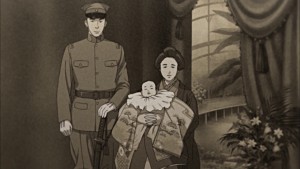 It may not be perfect, but Joker Game is a pretty special series. I can heap praise on the writing and the production all day long, especially when that Kawai Kenji soundtrack really soars – my goodness, what a huge asset he is to any show. But what I really admire is that it’s treading on such dangerous ground here. That an animated television program could go where Joker Game is going is a testament to just how differently animation is viewed in Japan than it is in most of the West. And ultimately, isn’t that a pretty big reason why so many fans love anime so much?
It may not be perfect, but Joker Game is a pretty special series. I can heap praise on the writing and the production all day long, especially when that Kawai Kenji soundtrack really soars – my goodness, what a huge asset he is to any show. But what I really admire is that it’s treading on such dangerous ground here. That an animated television program could go where Joker Game is going is a testament to just how differently animation is viewed in Japan than it is in most of the West. And ultimately, isn’t that a pretty big reason why so many fans love anime so much?
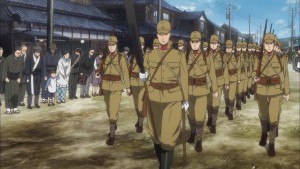 I find it both amusing and a little depressing that I’ve seen some Western viewers complain that Sakuma is “unrealistic” because of the views he expressed in the premiere. Seriously – how can anyone love a Japanese art form like anime and be so ill-informed about the country’s history? Jingoistic militarism caught Japan up in a chokehold in the 1930’s – this was a nation that surrendered at a far lower rate than any Western allies or enemies during World War II. The scenes at the beginning of the episode are only a gentle reminder of the madness that gripped Japan then – a madness that drove intelligent and thoughtful people to sign on to a war effort whose aftereffects still shake the country to the core even now, three-quarters of a century later.
I find it both amusing and a little depressing that I’ve seen some Western viewers complain that Sakuma is “unrealistic” because of the views he expressed in the premiere. Seriously – how can anyone love a Japanese art form like anime and be so ill-informed about the country’s history? Jingoistic militarism caught Japan up in a chokehold in the 1930’s – this was a nation that surrendered at a far lower rate than any Western allies or enemies during World War II. The scenes at the beginning of the episode are only a gentle reminder of the madness that gripped Japan then – a madness that drove intelligent and thoughtful people to sign on to a war effort whose aftereffects still shake the country to the core even now, three-quarters of a century later.
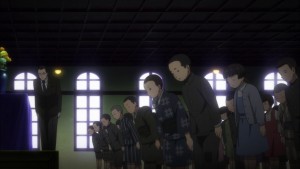 That’s the real point here – this time period is an uncomfortable subject for Japan even today, as its prime minister strives to scrap the pacifist constitution that arose from the ashes of the war and stir the flames of nationalism once more. Apologies for wartime atrocities and visits to military shrines are controversies that tear Japan apart still, and you have to admire the courage of writers like Yanagi Kouji who dare to talk about it in novels like Joker Game, and a studio like Production I.G. for bringing them to the screen. That disclaimer at the beginning of the episodes is not there by chance – this fence is electrified and probably always will be.
That’s the real point here – this time period is an uncomfortable subject for Japan even today, as its prime minister strives to scrap the pacifist constitution that arose from the ashes of the war and stir the flames of nationalism once more. Apologies for wartime atrocities and visits to military shrines are controversies that tear Japan apart still, and you have to admire the courage of writers like Yanagi Kouji who dare to talk about it in novels like Joker Game, and a studio like Production I.G. for bringing them to the screen. That disclaimer at the beginning of the episodes is not there by chance – this fence is electrified and probably always will be.
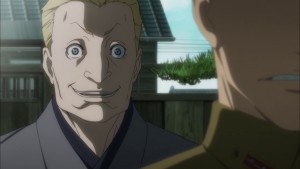 None of that would matter so much if Joker Game didn’t work as an entertainment, but it most certainly does. The game metaphor runs through this series but it seems more akin to chess (or Go) than poker, because where the wheat separates from the chaff is in seeing the long game. The raid at John Gordon’s house was many things, among them a test for Sakuma. Would he have been willing to commit harakiri if he hadn’t landed on the truth? One suspects he would – after all, many officers and enlisted men did no less during the war, something that can be traced all the way back to the samurai bushido code of honor. But in sensing the nature of the trap that had been laid for him, Sakuma not only saved his own life, but proved his worth to the D Agency.
None of that would matter so much if Joker Game didn’t work as an entertainment, but it most certainly does. The game metaphor runs through this series but it seems more akin to chess (or Go) than poker, because where the wheat separates from the chaff is in seeing the long game. The raid at John Gordon’s house was many things, among them a test for Sakuma. Would he have been willing to commit harakiri if he hadn’t landed on the truth? One suspects he would – after all, many officers and enlisted men did no less during the war, something that can be traced all the way back to the samurai bushido code of honor. But in sensing the nature of the trap that had been laid for him, Sakuma not only saved his own life, but proved his worth to the D Agency.
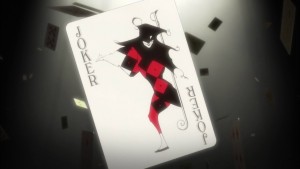 Obviously, a battle of wits between Yuuki and Mutou should be stopped on a TKO in the first round, but in the big picture Lt. Col. Yuuki is fighting what seems an utterly Quixotic war. Yuuki is in a position to destroy two men he’s outsmarted – Gordon and Mutou – yet he destroys neither. Why? Because in his world – where his scrappy little underfunded rabble are a drop of skepticism and reason in an ocean of propaganda and jingoism – everything must be measured in terms of value. Gordon is now useless as a spy – as useless as the ciphers he’s been feeding the American army. But as long as Gordon’s contacts believe those ciphers are still valid they’ll waste time using them. And because Gordon knows Yuuki can destroy him at any time, he can be coerced into actively working on his behalf.
Obviously, a battle of wits between Yuuki and Mutou should be stopped on a TKO in the first round, but in the big picture Lt. Col. Yuuki is fighting what seems an utterly Quixotic war. Yuuki is in a position to destroy two men he’s outsmarted – Gordon and Mutou – yet he destroys neither. Why? Because in his world – where his scrappy little underfunded rabble are a drop of skepticism and reason in an ocean of propaganda and jingoism – everything must be measured in terms of value. Gordon is now useless as a spy – as useless as the ciphers he’s been feeding the American army. But as long as Gordon’s contacts believe those ciphers are still valid they’ll waste time using them. And because Gordon knows Yuuki can destroy him at any time, he can be coerced into actively working on his behalf.
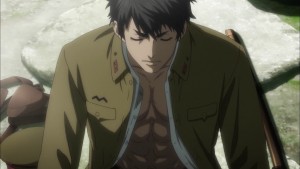 As for Mutou, he’s hoist by his own petard here. Revealing secrets and leaving his cigarette case behind at a geisha house is a huge blunder, but so is trying to use D Agency to try to cover his own failure in proving Gordon’s guilt. But he too is valuable to Yuuki now, because he too knows he can be destroyed at any time. This is the delicate game Yuuki is playing – he’s working on behalf of a system he despises, trying to find ways to undermine it without calling attention to that fact. It’s a dangerous agenda and Yuuki can’t afford to let anyone of value slip through his fingers (artificial or otherwise) – and Sakuma has proved he has value.
As for Mutou, he’s hoist by his own petard here. Revealing secrets and leaving his cigarette case behind at a geisha house is a huge blunder, but so is trying to use D Agency to try to cover his own failure in proving Gordon’s guilt. But he too is valuable to Yuuki now, because he too knows he can be destroyed at any time. This is the delicate game Yuuki is playing – he’s working on behalf of a system he despises, trying to find ways to undermine it without calling attention to that fact. It’s a dangerous agenda and Yuuki can’t afford to let anyone of value slip through his fingers (artificial or otherwise) – and Sakuma has proved he has value.
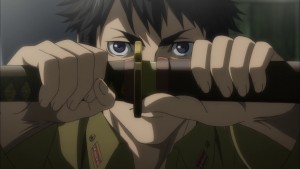 I said this last week, but I really believe Joker Game at its essence comes down to this: one can either choose to accept what they’re told at face value, or to question and consider everything including their own perception. Japan in 1937 is a runaway train of groupthink and obedience, and Yuuki is all about questioning everything. Throughout the first two episodes Sakuma has been tested over and over – shown a falsehood that was hiding a truth – and he’s learning to look beyond what his eyes and his prejudices (and his superiors) tell him. That’s subversive thinking now and it certainly was in 1937 – it could get you lined up in front of a wall and shot at the drop of a hat. And subversiveness is something we could all use a little more of.
I said this last week, but I really believe Joker Game at its essence comes down to this: one can either choose to accept what they’re told at face value, or to question and consider everything including their own perception. Japan in 1937 is a runaway train of groupthink and obedience, and Yuuki is all about questioning everything. Throughout the first two episodes Sakuma has been tested over and over – shown a falsehood that was hiding a truth – and he’s learning to look beyond what his eyes and his prejudices (and his superiors) tell him. That’s subversive thinking now and it certainly was in 1937 – it could get you lined up in front of a wall and shot at the drop of a hat. And subversiveness is something we could all use a little more of.


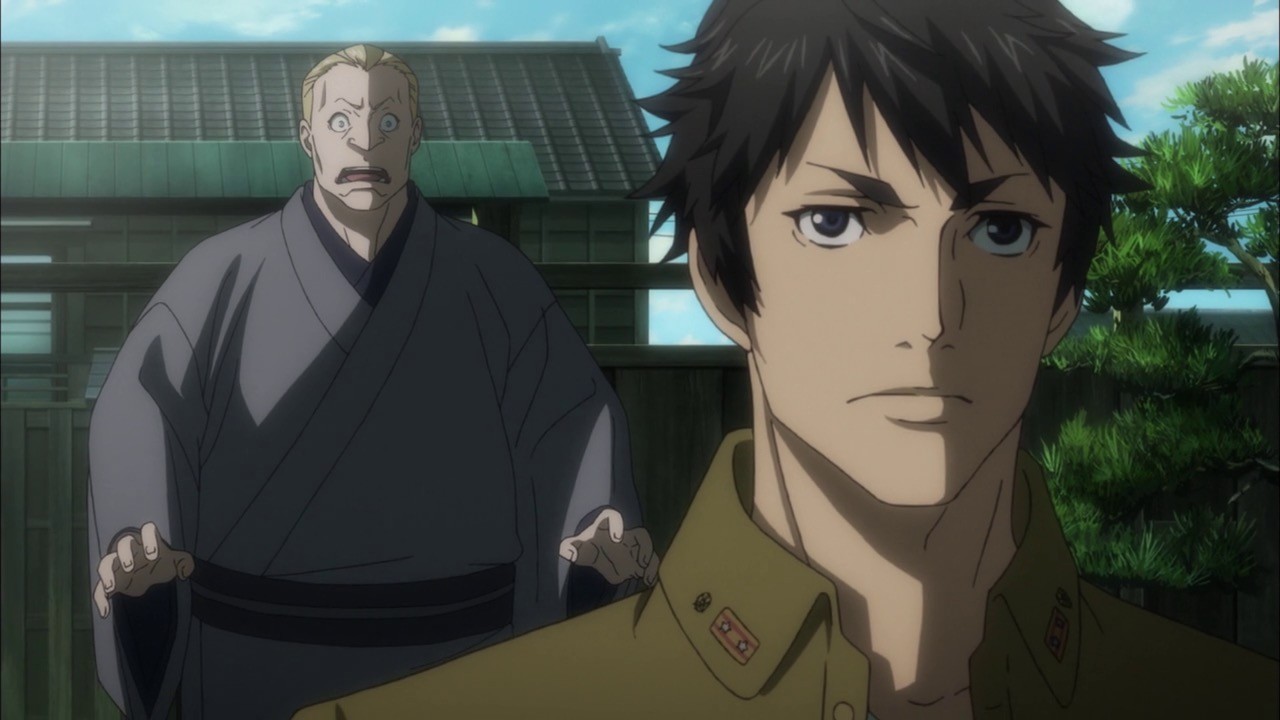
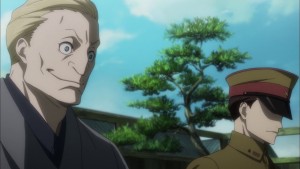
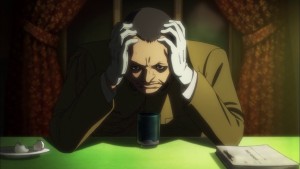
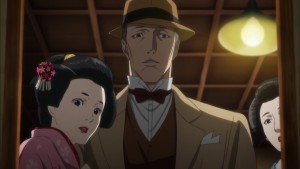
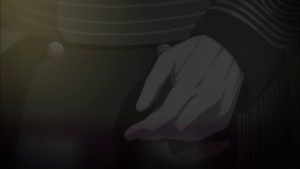
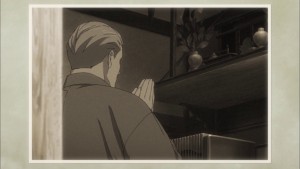
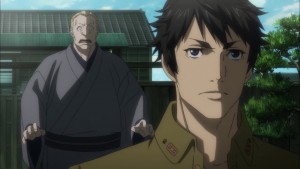
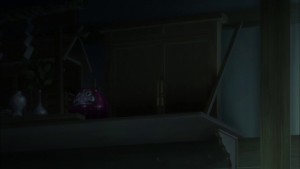
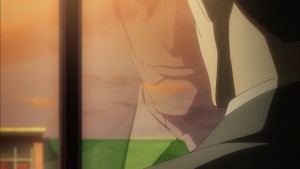
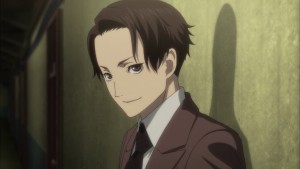
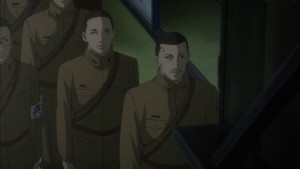
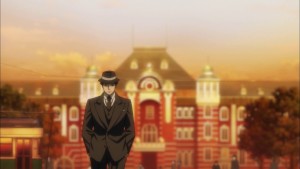
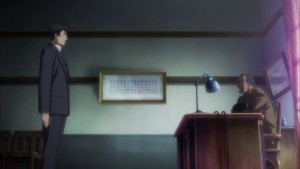
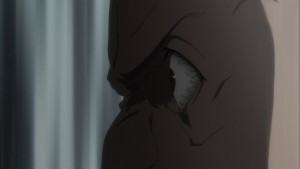
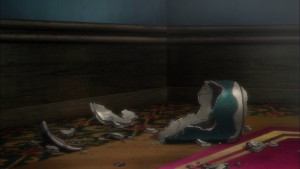
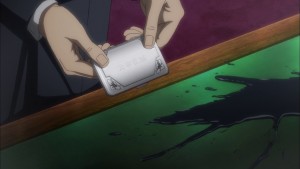
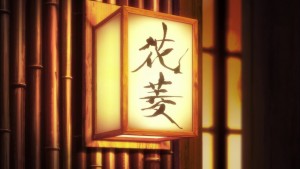
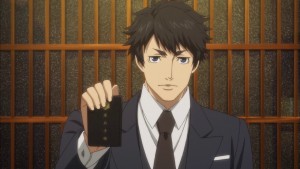
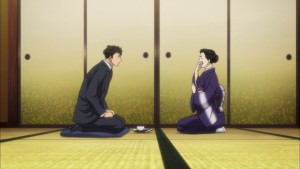
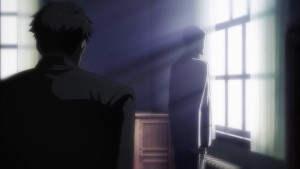
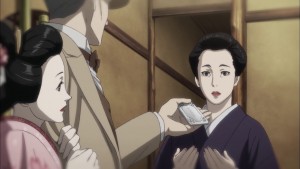
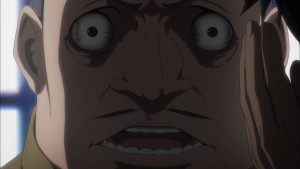
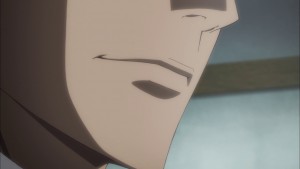
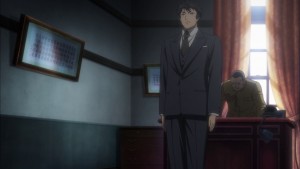
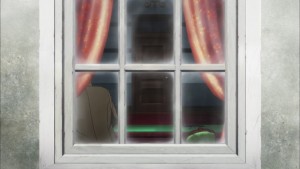
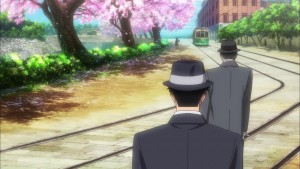

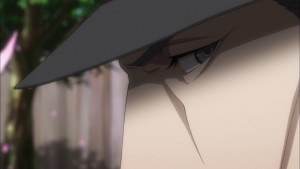
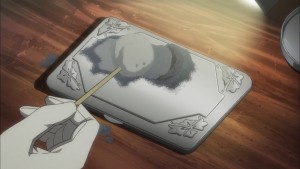
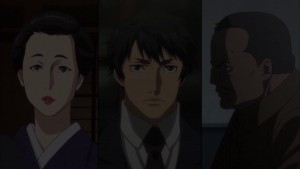
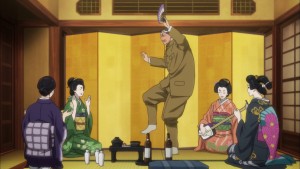
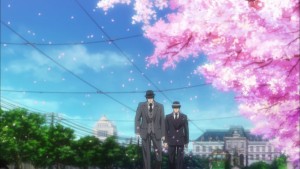
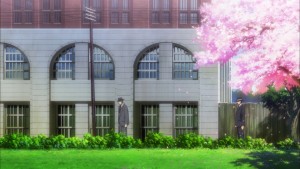
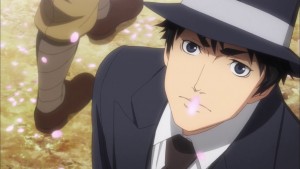
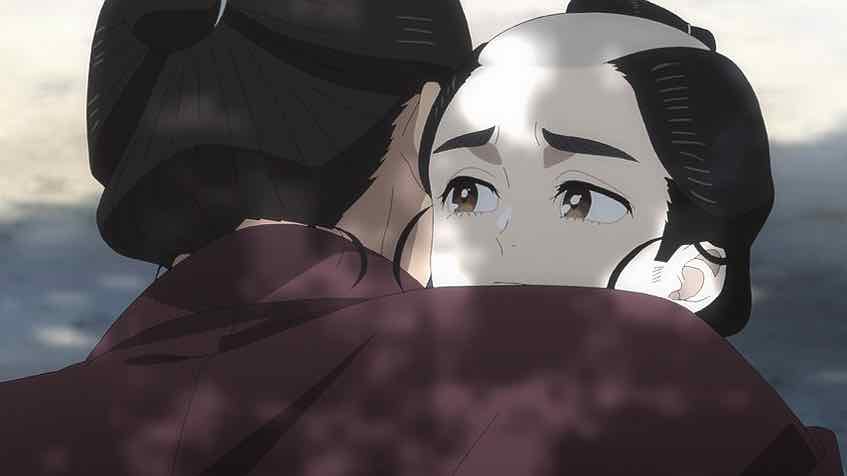

danes256
April 13, 2016 at 12:25 amIt’s my first time hearing people complained about the jingoism being unrealistic. Well, some people are just too lacking in knowledge, this is after all, a very accurate portrait of japan back then before the US occupation.
Nayrael
April 13, 2016 at 2:45 amWhat baffles me is that so many watchers think that the show glorifies Japanese jingoism of this era. To me, the show feels more like a grand criticism of the whole thing. Maybe it gets to show how Hollywood and other mainstream media have made people unable to see even through simple subtleties and make them think that it isn’t a criticism unless someone directly does it, preferably by yelling…
Guardian Enzo
April 13, 2016 at 8:06 amBingo.
hgfdsahjkl
April 13, 2016 at 4:02 amEpisode was amazing
but I had that little thing that keeps bugging me,how was the colonel able to pick up the cigarette case by his prosthetic arm,hand it to the geisha woman ,you will need fine finger movements to do such a thing inorder to not attract attention?that whole part felt unrealistic plus do you really expect to fool the special people of D.agency by a prosthetic arm
Yukie
April 13, 2016 at 8:15 amThe recaps in the beginning kind of irked me since this series only has 12 episodes, but I guess it was needed to pad out the conclusion of this wonderful two-part. That ending with the sakura was esp. wonderfully done,. with Lt. Colonel Yuuki walking off in one direction and the military marching off into another with Sakuma standing in the middle. Now my expectations are so high I’m keeping my fingers-crossed for Joker Game to continue to be awesome.
Dein
April 13, 2016 at 4:56 pmThat line at the very end was interesting, if a little ambigious. Does he still think that as a miliatry man he’s somehow different from the “coward” spies and their methods, and thus not a pawn, or does it signal him starting to reject the doctrine and realize that blind obedience will not cut it anymore?
As an aside, there’s always been this one that I was curious about. Whenever anime has a foreign character, it’s clear that they are voiced by a japanese actor. Maybe I’m overly critical, but that has always produced a very jarring effect. Joker Game isn’t even that bad compared to some other shows (off the top of my head, something like S2 of Genishken). Is this some sort of cultural thing or are there simply no foreigners avilable for the job? Seems like it would produce a much better result.
Christine
April 13, 2016 at 6:53 pmI don’t know if there’s just a limited pool of English speakers willing to voice act for anime in Japan, or if there is some other reason. However, the few times anime uses an anglophone, it still created a jarring effect. Night Raid 1931 had this with a 1930s Indian diplomat who spoke in a very thick American accent, and Free! featured some American voices actors doing their best Australian accent, which… was not the best but still not as jarring as in a historical anime like JG or Night Raid.
say
April 14, 2016 at 12:28 amI thought Gordon was mocking the solders since he is clearly fluent in japanese, pretending to speak like them. What about Miyoshi’s line? Was that good? I haven’t caught the words…
Daniel Wu
April 13, 2016 at 11:42 pmDoesn’t this mean a career opportunity for Enzo? He he. Just saying.
Gina
April 14, 2016 at 1:25 amEven if the country betrays me, I will not betray the country is how I think Sakuma is thinking. But he is the type who will certainly do things he thinks are in the larger interests of his country, even if he has to go against it.
I’m not well-read with Japanese history and politics, but I know a little bit and I can’t comprehend why the Japanese government cannot reconcile wartime issues, instead urging a militarist stand and hurting relations with neighbouring countries.
Mariko
April 14, 2016 at 3:38 amit’s not a geisha house by the way. That’s “Ryotei”, a luxurious Japanese restaurant. Geisha are sent from Okiya (geisha house) upon customers’ request to entertain, serve drink and etc.